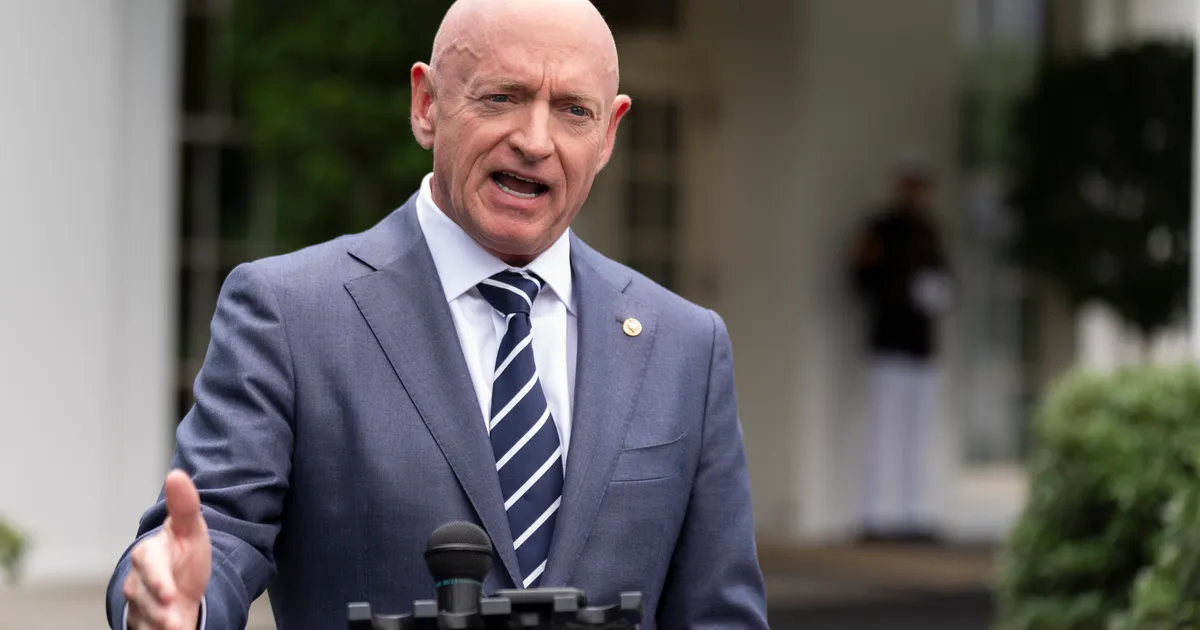
Sen. Mark Kelly (D-Ariz.) is proposing AI companies to contribute some of their “enormous profits” to a fund dedicated to helping American workers and communities grapple with likely job losses and infrastructure strain caused by the technology, a sign the Democratic Party is beginning to wrestle with what is expected to be a major fault line in politics over the next decade.
Kelly, a swing-state senator and potential 2028 presidential candidate, rolled out the idea in a white paper aiming to create “an AI boom for all, not another tech bubble for the few.” He’s unlikely to be the only major Democrat with ideas for how the party should grapple with a technology projected to replace 7% of all American jobs over the next decade and change the way millions more jobs function. The speed and size of the changes could move AI from being a boardroom concern today to a kitchen table concern by the time voters head to the polls in 2028.
Advertisement
“There’s a good chance this is one of the top issues that voters are concerned about,” said Bharat Ramamurti, the former deputy director of the National Economic Council under President Joe Biden. “I think it’s very likely that either they will see their jobs changing or disappearing because of AI, or someone in their family, or they’re hearing in the news all the time about how certain companies are cutting back on workers because of AI adoption, and they will want answers from policymakers.”
AI is likely to hit white-collar employment the hardest, meaning it could cause major economic problems for the college-educated voters and expensive metro areas that make up the Democratic Party’s base. The increasing likelihood of a recession in the coming years could also accelerate employers’ plans to adopt AI and lay off workers.
At the same time, the construction of AI-powering data centers, which put strains on the electrical grid, has become a flashpoint in cities and towns across the country, and concerns about AI’s potential to cause real-life harm are beginning to alarm lawmakers in both parties.
Advertisement
Kelly’s white paper aims to start at least a conversation about how to address all of these issues, with a proposed “AI Horizon Fund” as its centerpiece. The plan floats several potential fees or taxes AI companies could pay into the fund, including taxing “large-scale use of public resources, like power, water, and land; [p]rofits from digital ad tools powered by AI; or AI-based revenue windfalls.” The fund would be kept separate from Congress’ normal appropriations process.
Money from the fund would then be used to improve necessary infrastructure, fund clean energy and domestic supply chains and help workers who lost their jobs due to AI. (The plan repeatedly notes past federal efforts to help workers displaced by technology — like the Trade Adjustment Assistance program – are widely thought to have fallen short.)
“It’s common sense to tap the enormous profits of the big companies developing and deploying AI so innovation thrives, opportunity is shared, and every community benefits,” the paper reads.
Advertisement
Kelly, who was a top contender for the vice presidential slot on a ticket with 2024 Democratic nominee Kamala Harris, has already seen some political fights over AI in his home state: the Tucson City Council voted against a data center tied to Amazon last month over concerns about how much water it would use.
Still, political battles about AI are in their infancy — a skirmish over a 10-year ban on state-level AI regulations set to be included in the GOP’s budget bill ended with the ban stripped out of the eventual law signed by President Donald Trump.
PowerOurJournalism
Your SupportFuelsOur Mission
Your SupportFuelsOur Mission
Your membership fuels reporting that informs, inspires, and holds power accountable. Stand with us in this work – become a member now.
Join, Read, Impact
We remain committed to providing you with the unflinching, fact-based journalism everyone deserves.
Thank you again for your support along the way. We’re truly grateful for readers like you! Your initial support helped get us here and bolstered our newsroom, which kept us strong during uncertain times. Now as we continue, we need your help more than ever. We hope you will join us once again.
We remain committed to providing you with the unflinching, fact-based journalism everyone deserves.
Thank you again for your support along the way. We’re truly grateful for readers like you! Your initial support helped get us here and bolstered our newsroom, which kept us strong during uncertain times. Now as we continue, we need your help more than ever. We hope you will join us once again.
Support HuffPost
Already contributed? Log in to hide these messages.
And the AI industry has launched a super PAC, Leading The Future, with $100 million in funding and a mandate to “oppose policies that stifle innovation, enable China to gain global AI superiority, or make it harder to bring AI’s benefits into the world, and those who support that agenda.”
Advertisement
But Ramamurti thinks there will be real long-term political benefits to being a leader on the issue.
“If you’re a candidate in 2028, you’re going to need to be able to talk about what your plan is for making sure that people benefit from this broadly,” he said. “And I think voters will respect it if you’re not a Johnny-come-lately to this issue.”



